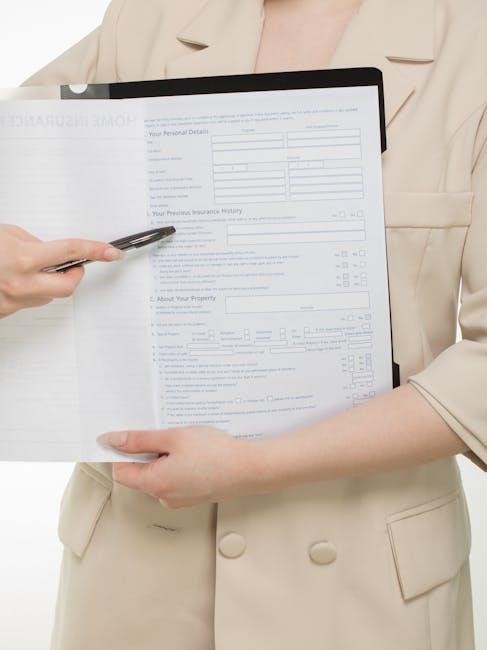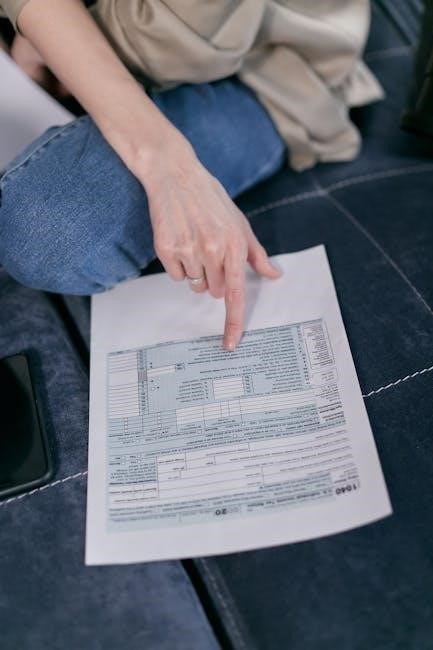A Residence Certificate is an official document verifying an individual’s legal residency in Thailand, essential for various legal and administrative purposes․
1․1 What is a Residence Certificate?
A Residence Certificate, also known as a “Certificate of Residence,” is an official document issued by Thai authorities to confirm an individual’s legal residency in Thailand․ It serves as proof of a person’s address and is typically required for various legal, administrative, and financial transactions within the country․ The certificate is usually issued by the local district office or immigration authorities and contains essential details such as the applicant’s name, nationality, and registered address in Thailand․ It is a crucial document for foreigners and Thai citizens alike, ensuring compliance with legal requirements and facilitating access to essential services like banking, employment, and healthcare․
1․2 Importance of a Residence Certificate in Thailand
A Residence Certificate is essential for verifying legal residency in Thailand, ensuring compliance with immigration laws and regulations․ It is required for accessing essential services such as opening a bank account, securing employment, and obtaining healthcare․ The certificate also serves as a crucial document for obtaining a Thai driver’s license and can be necessary for visa renewal or extension processes․ Additionally, it is often requested for property purchases, business registrations, and other legal procedures․ Having a Residence Certificate simplifies various administrative tasks and ensures that individuals can fully integrate into Thai society and economy without legal hindrances․
1․3 Who Needs a Residence Certificate?
A Residence Certificate is typically required for foreign nationals residing in Thailand, including expatriates, long-term visitors, and individuals conducting business or employment in the country․ It is essential for anyone seeking to establish legal residency, access public services, or engage in activities that require proof of address․ This includes individuals applying for work permits, those intending to purchase property, and foreigners married to Thai citizens․ Additionally, students, retirees, and entrepreneurs often need a Residence Certificate to facilitate their stay and comply with Thai immigration regulations․ Essentially, anyone requiring official verification of their residency status in Thailand will need this document to ensure legal compliance and access to essential services․

Eligibility Criteria for Applying
Eligibility for a Residence Certificate in Thailand is based on legal residency, valid visa status, and compliance with Thai immigration laws․ It applies to expatriates, employment visa holders, and long-term residents․
2․1 Who is Eligible for a Residence Certificate?
Eligibility for a Residence Certificate in Thailand typically includes expatriates, employment visa holders, and long-term residents who comply with Thai immigration laws․ Applicants must have a valid visa and a legitimate basis for residency, such as employment, business ownership, or property ownership․ Foreign nationals married to Thai citizens or with Thai children may also qualify․ Additionally, retirees and students with proper documentation are eligible․ The certificate is not issued to tourists or individuals on temporary visas․ Eligibility is strictly determined by legal residency status and compliance with immigration regulations․ Proper documentation and proof of lawful stay are required to apply․
2․2 Special Cases and Exceptions
Special cases for Residence Certificate eligibility include diplomatic personnel, refugees, or individuals with extraordinary circumstances approved by Thai authorities․ Stateless persons or those with unresolved nationality issues may also qualify under specific conditions․ Additionally, foreigners with Thai heritage or exceptional contributions to Thailand might be eligible․ These cases often require additional documentation or special approval from immigration authorities․ Exceptions may apply for individuals on official missions or those granted special residency privileges․ It is important to consult with Thai immigration officials for personalized guidance, as these cases are handled on a discretionary basis and may involve unique requirements or procedures․

Required Documents for Application
The application requires a valid passport, visa, proof of address, financial statements, and employment verification, along with completed forms and recent photographs․
3․1 Personal Identification Documents
Applicants must provide a valid passport with a current visa stamp or extension․ Include a copy of the visa page and all relevant entry/exit stamps․ Submit a certified copy of your arrival/departure card, a photocopy of your Thai driver’s license (if applicable), and a recent passport-sized photo․ Ensure all documents are up-to-date and valid․ Certified true copies of these documents are typically required․ Check with the issuing office for specific certification requirements․ Failure to provide accurate identification may delay the application process․ Ensure all personal details match across documents to avoid discrepancies․ This step is critical for verifying your identity and legal status in Thailand․
3․2 Proof of Address in Thailand
Applicants must submit a valid proof of address in Thailand․ A rental contract or lease agreement is commonly accepted, ensuring it is signed and includes the landlord’s details․ Alternatively, a house registration document (Tabien Baan) in the applicant’s name is required․ If residing with a Thai national or legal resident, a letter confirming residency, stamped by the local authorities, may be accepted․ Utility bills (e․g․, electricity or water) in the applicant’s name, dated within the last three months, can also serve as proof․ Ensure all documents are current and not expired․ If documents are in a language other than Thai or English, certified translations are necessary․ This step verifies your residence in Thailand, so accuracy is crucial․ Always check with the relevant office for specific requirements to avoid delays․
3․3 Financial Proof and Income Certification
Financial proof and income certification are essential to demonstrate economic stability in Thailand․ Applicants must provide bank statements showing a minimum balance, often required by Thai immigration authorities․ These statements should cover the past six months and be stamped by the bank․ For employed individuals, a signed employment letter detailing salary, position, and duration of employment is necessary․ Self-employed applicants must submit business registration documents and recent tax filings․ Retirement or pension statements, if applicable, should also be included․ All documents must be current and notarized if originating from outside Thailand․ Ensure financial proof aligns with the requirements specified by the relevant authorities to avoid application delays․ This step confirms your ability to sustain yourself financially in Thailand․
3․4 Other Supporting Documents
Additional documents may be required to strengthen your application․ A cover letter explaining the purpose of your residence is often necessary․ If married to a Thai national, include your marriage certificate․ For applicants with children, birth certificates may be requested․ A letter of invitation from a Thai resident or property owner can also be submitted․ Ensure all documents are translated into Thai and legalized․ Recent passport-sized photographs are typically required․ Check with local authorities for specific requirements, as they may vary by province or immigration office․ Ensuring all documents are up-to-date and accurately reflect your current status is crucial for a smooth application process․

The Application Process
The application process involves obtaining the form, preparing required documents, submitting your application, and following up on its status․
4․1 Step 1: Obtain the Application Form
The first step in applying for a Residence Certificate in Thailand is to obtain the official application form․ This form can typically be downloaded from the Thai Immigration Bureau’s website or collected in person from a local immigration office․ Ensure you use the most recent version of the form, as outdated versions may be rejected․ The form is usually provided in Thai, so non-Thai speakers may need assistance to understand and complete it accurately․ Carefully review the form for any specific instructions or additional documentation requirements․ Once you have the form, print it on A4-sized paper and prepare to fill it out in the next step․ Always double-check for any updates or changes to the form before proceeding․
4․2 Step 2: Fill Out the Application Form
Filling out the application form accurately is crucial to avoid delays․ Use block letters and ensure all information is complete and truthful․ Include personal details, address, and reason for applying․ Review the form for any specific instructions or additional requirements․ If the form is in Thai, consider seeking assistance from a fluent speaker or translator․ Double-check for errors or omissions, as incomplete forms may be rejected․ Attach required supporting documents as specified․ Ensure all signatures and dates are correct․ Photocopy the completed form for your records․ Avoid using correction fluid or making alterations, as this may lead to complications․ Once completed, proceed to the next step of submitting the application․
4․3 Step 3: Submit the Application
Once the application form is complete, submit it to the appropriate Thai government office or embassy, depending on your location․ Ensure all required documents are included and originals are available for verification․ Photocopy all submitted documents for your records․ In some cases, a receipt or tracking number may be provided upon submission․ Be prepared to pay any applicable fees at this stage․ If submitting in person, arrive early and follow the office’s procedures․ For mail submissions, use a secure method with tracking․ Double-check the submission address and requirements to avoid delays․ Keep the receipt or confirmation as proof of submission for future reference․
4․4 Step 4: Follow Up on the Application Status
After submitting your application, it is crucial to monitor its progress to ensure timely processing․ Most government offices provide a tracking number or online portal to check the status․ Use this to verify if your application is under review or if additional documents are required․ If you submitted in person, contact the office directly via phone or email․ For mail submissions, wait the recommended processing time before following up․ Keep all receipts and documents handy in case further verification is needed․ Regular follow-ups demonstrate responsibility and help avoid delays․ Stay informed to ensure your application is processed smoothly and efficiently․

Detailed Guide to Required Documents
This section outlines the essential documents needed for a Residence Certificate application, ensuring accuracy and completeness in your submission to Thai authorities․
5․1 Passport and Visa Requirements
Your valid passport and appropriate visa are essential for the Residence Certificate application․ Ensure your passport is valid for at least six months beyond your intended stay․ The visa must align with your residency purpose, whether for work, retirement, or other qualifying reasons․ Even if your visa is nearing expiration, it must still be valid at the time of application․ A certified translation of your passport may be required if it is not in English․ Submit clear copies of your passport’s biodata page and visa stamp․ Original documents should be available for verification during the application process․ Accurate passport and visa details are critical for a successful application․
5․2 Lease Agreement or Property Ownership Documents
A valid lease agreement or property ownership document is required to prove your address in Thailand․ For renters, a signed lease agreement detailing the landlord’s name, property address, and rental period is necessary․ Ensure the document is registered with the relevant authorities․ If you own the property, submit a copy of the “Chanot” (title deed), which includes details of the property location and ownership․ These documents must be in Thai; if translated, they should be certified․ Submit both the original and a copy for verification․ Accurate and complete address proof is crucial for a successful application․ Always ensure the documents are up-to-date and valid․
5․3 Bank Statements and Financial Proof
Bank statements and financial proof are essential to demonstrate your financial stability in Thailand․ Submit recent bank statements (within the last three months) from a Thai bank or an international bank with a Thai branch․ The statements must show a minimum balance, typically 40,000 THB for individuals, which may increase for families․ Ensure the statements are signed and stamped by the bank․ If the document is in a foreign language, provide a certified translation․ Additionally, include proof of income, such as salary slips or letters from employers, to confirm your financial capacity․ Consistent transactions showing regular income or sufficient funds are crucial for a successful application․ Accurate financial documentation ensures compliance with residency requirements․
5․4 Employment Letter or Self-Employment Certification
An employment letter or self-employment certification is required to verify your income source in Thailand․ For employed individuals, the letter must state your position, salary, and employment duration, issued by your employer on official letterhead․ It should be signed and stamped by the company․ For self-employed individuals, provide a certification from the Department of Business Development or a notarized document detailing your business activities and income․ Ensure the document is in English or Thai; if not, provide a certified translation․ This proof of income demonstrates financial stability, which is crucial for residency applications․ Accurate and up-to-date documentation is essential to avoid delays or rejection․

Processing Time and Fees
Processing time for a Residence Certificate typically ranges from 1 to 4 weeks, depending on the complexity․ Fees vary based on application type and verification requirements, paid via cash or cashier’s check․
6․1 Average Processing Time for Applications
The average processing time for a Residence Certificate in Thailand typically ranges from 1 to 4 weeks, depending on the workload of the local immigration office․ In major cities like Bangkok, processing may take longer due to higher volumes of applications, while smaller provinces often see faster turnaround times․ Delays can occur if additional documentation is required or if there are discrepancies in the submitted paperwork․ Applicants are advised to submit their applications well in advance of any deadlines to account for potential delays․ Processing times may also vary during peak travel seasons or holidays․ Plan accordingly to avoid unnecessary complications․
6․2 Associated Fees and Payment Methods
The fees for a Residence Certificate in Thailand are generally affordable and vary based on the applicant’s nationality and the complexity of the case․ Typically, the application fee ranges between 500 to 2,000 THB, depending on the type of residence certificate and the duration of stay․ Payments are usually accepted in cash at the immigration office or local district office where the application is submitted․ Some offices may also accept bank drafts or other secure payment methods․ It is important to verify the exact fee with the relevant authorities before submitting the application to avoid any discrepancies․ Additional costs may apply for expedited services or special requests․

Importance of the Residence Certificate
A Residence Certificate in Thailand is crucial for legal compliance, accessing essential services, and obtaining benefits․ It verifies your legal status, aiding in various administrative processes efficiently․
7․1 Legal Compliance and Requirements
The Residence Certificate ensures compliance with Thai immigration laws, verifying lawful stay for non-citizens․ It is mandated for foreigners residing in Thailand, demonstrating adherence to visa regulations and residency obligations․ Failure to obtain or renew the certificate can result in legal penalties, fines, or deportation․ The document is essential for maintaining legal status, avoiding complications with authorities, and ensuring uninterrupted stay in the country․ It also serves as proof of residency for accessing public services, opening bank accounts, and conducting official business․ Compliance with these requirements is non-negotiable for foreigners in Thailand, making the Residence Certificate a critical legal document․
7․2 Practical Uses of the Certificate
The Residence Certificate simplifies various aspects of life in Thailand for foreigners․ It is required for opening bank accounts, purchasing property, and securing employment opportunities․ Additionally, it facilitates access to government services, such as healthcare and utilities․ The certificate is often needed for registering a business or enrolling children in schools; It also serves as a vital document when applying for a driver’s license or renewing a visa․ For long-term residents, the certificate provides proof of address, making everyday transactions and official processes more efficient․ Overall, it is an essential tool for integrating into Thai society and ensuring a smooth experience for foreigners residing in the country․

Common Mistakes to Avoid
Common mistakes include submitting incomplete forms, providing expired documents, and missing deadlines․ Ensure all details are accurate and documents are valid to avoid application rejection․
8․1 Incomplete or Incorrect Application Forms
Submitting an incomplete or incorrect application form is a common mistake that can delay or reject your Residence Certificate request․ Ensure all fields are filled accurately, and required information such as personal details, address, and contact information is correct․ Double-check for any typos or omissions, especially in critical sections like passport numbers or visa details․ Missing signatures or dates can also lead to rejection․ Use the latest version of the form and fill it in clearly, avoiding illegible handwriting․ If unsure, consider using online tools or consulting with officials to ensure accuracy․ Proofread thoroughly before submission to avoid unnecessary delays․
8․2 Missing or Expired Documents

One of the most frequent errors in Residence Certificate applications is the submission of missing or expired documents․ Ensure all required documents, such as your passport, visa, and proof of address, are up to date and included․ Expired documents, like a visa or passport, can lead to immediate rejection․ Double-check expiration dates before submitting and replace any outdated documents․ Additionally, verify that all copies are clear and legible․ Missing documents, such as a lease agreement or bank statement, can also cause delays․ Organize your paperwork meticulously and use a checklist to confirm everything is in order before submission to avoid this common pitfall․
8․3 Delayed Submission and Deadlines
Delayed submission of your Residence Certificate application can result in processing delays, impacting your legal residency status․ Ensure you submit all documents well before deadlines to avoid complications․ Late submissions may lead to penalties or even rejection, requiring you to restart the process․ Plan ahead, as processing times can vary, and delays may affect other legal obligations, such as visa renewals or employment contracts․ Set personal deadlines earlier than the official ones to account for unexpected issues․ Timely submission is crucial for maintaining legal compliance and avoiding unnecessary stress or financial repercussions․ Prioritize organization and prompt action to ensure a smooth experience․

Legal Consequences of Misuse
Misusing a Residence Certificate can lead to legal penalties, fines, and deportation․ Providing false information or altering the document is illegal and severely punished under Thai law․
9․1 Penalties for Submitting False Information
Submitting false information in a Residence Certificate application can result in severe legal repercussions․ Under Thai law, such offenses are considered serious and may lead to hefty fines, deportation, or both․ Additionally, individuals found guilty of providing fraudulent documents or misrepresenting facts may face criminal charges, including imprisonment․ The Thai authorities rigorously enforce immigration laws, and any violation can result in long-term consequences, such as being banned from re-entering the country․ It is crucial to ensure all information provided is accurate and truthful to avoid these penalties․ Applicants must carefully review their documents to prevent any unintentional errors that could lead to legal complications․
9․2 Consequences of Overstaying or Illegal Residence
Overstaying a visa or residing illegally in Thailand carries significant legal consequences․ Individuals found guilty may face substantial fines, imprisonment, or both․ The penalties increase with the duration of the overstay, and repeat offenders face harsher sanctions․ Additionally, overstaying can lead to deportation and being banned from re-entering Thailand for several years․ Illegal residence also damages one’s legal record, making it difficult to obtain future visas or residency permits․ The Thai immigration authorities enforce these laws strictly, and those caught overstaying are subject to immediate detention and legal proceedings․ It is essential to comply with visa terms to avoid these severe repercussions and maintain legal status in the country;
Obtaining a Residence Certificate in Thailand streamlines legal processes, ensuring compliance and ease in daily life․ Follow guidelines carefully and seek assistance if needed for a hassle-free experience․
10․1 Final Tips for a Smooth Application Process
To ensure a seamless application process, thoroughly prepare all required documents and double-check for accuracy․ Understand the eligibility criteria and requirements beforehand to avoid delays․ Complete the application form carefully, ensuring all information aligns with your documents․ Submit your application well in advance of deadlines to account for processing time․ If unsure about any step, consult with immigration experts or legal professionals․ Stay informed about any updates or changes in regulations․ Keeping copies of all submitted documents is also advisable for future reference․ By being organized and proactive, you can navigate the process efficiently and reduce the likelihood of complications․
10․2 Contact Information for Further Assistance
For further assistance with your Residence Certificate application, contact the Thai Immigration Bureau at www․immigration․go․th․ The main office is located in Bangkok at 120 Moo 3, Chaengwattana Road, Thungsonghong, Laksi, Bangkok 10210․ You can reach them via phone at +66 98 386 4363 or email at feedback@immigration․go․th․ For regional inquiries, visit the website to find contact details for your local immigration office․ Ensure all information is verified before submission to avoid delays․ If unsure, consult with immigration experts or legal professionals for guidance․
